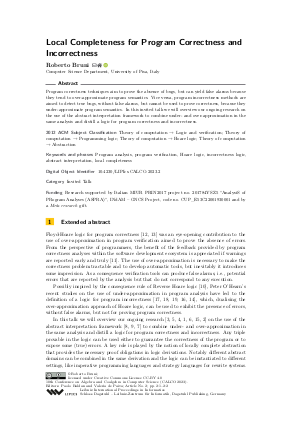Local Completeness for Program Correctness and Incorrectness (Invited Talk)
Author
Roberto Bruni 
-
Part of:
Volume:
10th Conference on Algebra and Coalgebra in Computer Science (CALCO 2023)
Part of: Series: Leibniz International Proceedings in Informatics (LIPIcs)
Part of: Conference: Conference on Algebra and Coalgebra in Computer Science (CALCO) - License:
 Creative Commons Attribution 4.0 International license
Creative Commons Attribution 4.0 International license
- Publication Date: 2023-09-02
File

PDF
LIPIcs.CALCO.2023.2.pdf
- Filesize: 427 kB
- 2 pages
Document Identifiers
Subject Classification
ACM Subject Classification
- Theory of computation → Logic and verification
- Theory of computation → Programming logic
- Theory of computation → Hoare logic
- Theory of computation → Abstraction
Keywords
- Program analysis
- program verification
- Hoare logic
- incorrectness logic
- abstract interpretation
- local completeness
Metrics
- Access Statistics
-
Total Accesses (updated on a weekly basis)
0PDF Downloads0Metadata Views
Abstract
Program correctness techniques aim to prove the absence of bugs, but can yield false alarms because they tend to over-approximate program semantics. Vice versa, program incorrectness methods are aimed to detect true bugs, without false alarms, but cannot be used to prove correctness, because they under-approximate program semantics. In this invited talk we will overview our ongoing research on the use of the abstract interpretation framework to combine under- and over-approximation in the same analysis and distill a logic for program correctness and incorrectness.
Cite As Get BibTex
Roberto Bruni. Local Completeness for Program Correctness and Incorrectness (Invited Talk). In 10th Conference on Algebra and Coalgebra in Computer Science (CALCO 2023). Leibniz International Proceedings in Informatics (LIPIcs), Volume 270, pp. 2:1-2:2, Schloss Dagstuhl – Leibniz-Zentrum für Informatik (2023)
https://doi.org/10.4230/LIPIcs.CALCO.2023.2
BibTex
@InProceedings{bruni:LIPIcs.CALCO.2023.2,
author = {Bruni, Roberto},
title = {{Local Completeness for Program Correctness and Incorrectness}},
booktitle = {10th Conference on Algebra and Coalgebra in Computer Science (CALCO 2023)},
pages = {2:1--2:2},
series = {Leibniz International Proceedings in Informatics (LIPIcs)},
ISBN = {978-3-95977-287-7},
ISSN = {1868-8969},
year = {2023},
volume = {270},
editor = {Baldan, Paolo and de Paiva, Valeria},
publisher = {Schloss Dagstuhl -- Leibniz-Zentrum f{\"u}r Informatik},
address = {Dagstuhl, Germany},
URL = {https://drops.dagstuhl.de/entities/document/10.4230/LIPIcs.CALCO.2023.2},
URN = {urn:nbn:de:0030-drops-187993},
doi = {10.4230/LIPIcs.CALCO.2023.2},
annote = {Keywords: Program analysis, program verification, Hoare logic, incorrectness logic, abstract interpretation, local completeness}
}
Author Details
Funding
Research supported by Italian MIUR PRIN2017 project no. 201784YSZ5 "AnalysiS of PRogram Analyses (ASPRA)", INdAM - GNCS Project, code no. CUP_E53C22001930001 and by a Meta research gift.
References
- Flavio Ascari, Roberto Bruni, and Roberta Gori. Limits and difficulties in the design of under-approximation abstract domains. In Proc. of FOSSACS 2022, volume 13242 of LNCS, pages 21-39. Springer, 2022. URL: https://doi.org/10.1007/978-3-030-99253-8_2.
- Flavio Ascari, Roberto Bruni, and Roberta Gori. Logics for extensional, locally complete analysis via domain refinements. In Proc. of ESOP 2023, volume 13990 of LNCS, pages 1-27. Springer, 2023. URL: https://doi.org/10.1007/978-3-031-30044-8_1.
- Roberto Bruni, Roberto Giacobazzi, Roberta Gori, and Francesco Ranzato. A logic for locally complete abstract interpretations. In Proc. of LICS 2021, Distinguished Paper, pages 1-13. IEEE, 2021. URL: https://doi.org/10.1109/LICS52264.2021.9470608.
- Roberto Bruni, Roberto Giacobazzi, Roberta Gori, and Francesco Ranzato. Abstract interpretation repair. In Proc. of PLDI'22, pages 426-441. ACM, 2022. URL: https://doi.org/10.1145/3519939.3523453.
- Roberto Bruni, Roberto Giacobazzi, Roberta Gori, and Francesco Ranzato. A correctness and incorrectness program logic. J. ACM, 70(2):15:1-15:45, 2023. URL: https://doi.org/10.1145/3582267.
- Marco Campion, Mila Dalla Preda, and Roberto Giacobazzi. Partial (in)completeness in abstract interpretation: limiting the imprecision in program analysis. Proc. ACM Program. Lang., 6(POPL):1-31, 2022. URL: https://doi.org/10.1145/3498721.
-
Patrick Cousot. Principles of Abstract Interpretation. MIT Press, 2021.

- Patrick Cousot and Radhia Cousot. Abstract interpretation: A unified lattice model for static analysis of programs by construction or approximation of fixpoints. In Proc. of POPL 1977, pages 238-252. ACM, 1977. URL: https://doi.org/10.1145/512950.512973.
- Patrick Cousot and Radhia Cousot. Systematic design of program analysis frameworks. In Proc. ACM POPL 1979, pages 269-282. ACM, 1979. URL: https://doi.org/10.1145/567752.567778.
- Edsko de Vries and Vasileios Koutavas. Reverse Hoare logic. In Proc. of SEFM 2011, pages 155-171. Springer Berlin Heidelberg, 2011. URL: https://doi.org/10.1007/978-3-642-24690-6_12.
- Dino Distefano, Manuel Fähndrich, Francesco Logozzo, and Peter W. O'Hearn. Scaling static analyses at Facebook. Commun. ACM, 62(8):62-70, 2019. URL: https://doi.org/10.1145/3338112.
-
Robert W. Floyd. Assigning meanings to programs. Proceedings of Symposium on Applied Mathematics, 19:19-32, 1967.

- C. A. R. Hoare. An axiomatic basis for computer programming. Commun. ACM, 12(10):576-580, October 1969. URL: https://doi.org/10.1145/363235.363259.
- Quang Loc Le, Azalea Raad, Jules Villard, Josh Berdine, Derek Dreyer, and Peter W. O'Hearn. Finding real bugs in big programs with incorrectness logic. Proc. ACM Program. Lang., 6(OOPSLA1):1-27, 2022. URL: https://doi.org/10.1145/3527325.
- Marco Milanese and Francesco Ranzato. Local completeness logic on Kleene algebra with tests. In Proc. of SAS 2022, volume 13790 of LNCS, pages 350-371. Springer, 2022. URL: https://doi.org/10.1007/978-3-031-22308-2_16.
- Bernhard Möller, Peter W. O'Hearn, and Tony Hoare. On algebra of program correctness and incorrectness. In Proc. of RAMiCS 2021, volume 13027 of LNCS, pages 325-343. Springer, 2021. URL: https://doi.org/10.1007/978-3-030-88701-8_20.
- Peter W. O'Hearn. Incorrectness logic. Proc. ACM Program. Lang., 4(POPL):10:1-10:32, 2020. URL: https://doi.org/10.1145/3371078.
- Azalea Raad, Josh Berdine, Hoang-Hai Dang, Derek Dreyer, Peter W. O'Hearn, and Jules Villard. Local reasoning about the presence of bugs: Incorrectness separation logic. In Proc. of CAV 2020, Part II, volume 12225 of LNCS, pages 225-252. Springer, 2020. URL: https://doi.org/10.1007/978-3-030-53291-8_14.
- Azalea Raad, Josh Berdine, Derek Dreyer, and Peter W. O'Hearn. Concurrent incorrectness separation logic. Proc. ACM Program. Lang., 6(POPL):1-29, 2022. URL: https://doi.org/10.1145/3498695.
